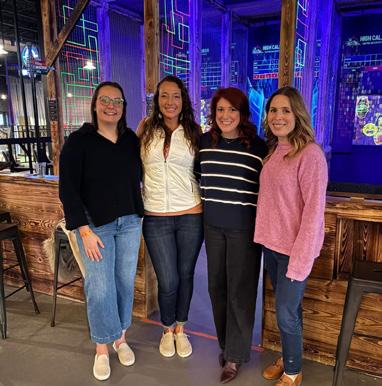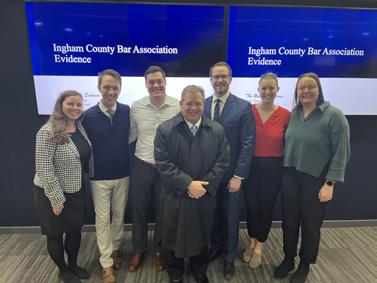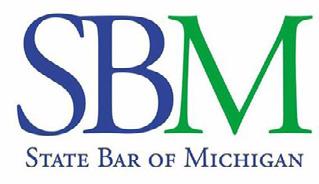Ingham County Bar Association
Upcoming Events, Page 2 | President’s Message, Page 4





Ingham County Bar Association
Upcoming Events, Page 2 | President’s Message, Page 4




Founded in 1895, the Ingham County Bar Association continues its longstanding tradition of service to the legal profession and the greater Lansing community, bringing lawyers together to join in a strong organization that works to achieve objectives that transcend the individual.
INGHAM COUNTY
BAR ASSOCIATION
P.O. Box 66
Grand Ledge, MI 48837 www.inghambar.org
BOARD OF DIRECTORS
President Lindsay Dangl Murphy & Spagnuolo PC
President Elect
Alexander Rusek
Foster Swift Collins & Smith PC
Vice President
Jessica Zimbelman State Appellate Defender Office
Treasurer Mary Bowen
Michigan Attorney Grievance Commission
Secretary Nolan Erickson Grewal Law PLLC
Immediate Past President
Stephen Sinas Sinas Dramis Law Firm
Tiffany DeBruin DeBruin Law PLLC
Logan Byrne Byrne Law, PLLC
Jacquelyn Dupler
Foster Swift Collins & Smith PC
Marisa Vinsky
Chartier & Nyamfukudza, P.L.C.
Lauren Kissel Sinas, Dramis, Larkin, Graves & Waldman, P.C.
Lynn Osborne Osborne & Barrett PLLC
Theodore Seitz Dykema Gossett PLLC
Catherine Tucker Sinas, Dramis, Larkin, Graves & Waldman, P.C.
Chris Wickman Nichols Law Firm
Criminal Defense Law
Marisa Vinsky
Chartier & Nyamfukudza, PLC
Chris Wickman
Nichols Law Firm, PLLC
Employment & Labor Law
Kelly McClintock
Blanchard & Walker PLLC
Family Law
Jennipher Martinez
White Schneider Young & Chiodini, PC
Erica Terranova
Bailey & Terranova
Paralegal/Legal Assistant
Megan L. Cochrane
Foster Swift Collins & Smith PC
Emily Erbisch
O’Keefe Law, PLLC
Lizzy Sailor
Chartier & Nyamfukudza, PLC
Probate & Trust Law
Ernscie Augustin
Augustin Law Offices
Real Estate Law
William D. Tomblin
William D. Tomblin & Associates
Ellen E. Ward
Oade Stroud & Kleiman PC
Mitchell Zolton
Fahey Schultz Burzych Rhodes PLC
Young Lawyers
Lauren Kissel
Sinas, Dramis, Larkin, Graves & Waldman, P.C.
Annual Dinner
Alex Rusek / Jessica Zimbelman
Annual Meeting
Alex Rusek / Michael Van Huysse
Ask A Lawyer Committee
Raymond Harris / Brandon Schumacher / Sean Lyons / Linda Rawls
Awards
Lynn Osborne / Theodore Seitz
DEI
Kristina Bilowus
Meet the Judges
Nolan Erickson / Tiffany DeBruin
Membership
Jacquelyn Dupler / Theodore Seitz
Nominating Committee
Stephen Sinas
Past Presidents’
Stephen Sinas
Section Chair Liason
Jessica Zimbelman
Shrimp Dinner
Alex Rusek / Michael Van Huysse
Social Deliberations
Stephen Sinas
Social Media
Tiffany DeBruin / Staff
Sponsors
Katie Tucker / Alex Rusek
Wellness Committee
Chris Wickman / Jacquelyn Dupler
EXECUTIVE DIRECTOR
Madelyne Lawry
517-627-3938

Lindsay Dangl, Murphy & Spagnuolo PC
ldangl@mbspclaw.com
I spent nearly 15 years in leadership with the Ingham County Bar Association, and stepping into the role of President was something I genuinely looked forward to. But, as is often the case with good things, the term went by in the blink of an eye. As my term as President comes to an end, I want to express my deep gratitude for the privilege of serving this organization and the dedicated professionals who make up its membership. It has been an honor to work alongside attorneys who are committed not just to their clients, but to one another, to the rule of law, and to justice in our community.
This past year, I set out with the goal to grow our membership and reengage those who may have drifted away during the more isolated days of Zoom courtrooms and virtual seminars. To do that, I had numerous conversations with lawyers from all walks of practice – both public and private. I’ve had the privilege to learn more about what motivates individuals and what brought them to their career path. I spoke with solo practitioners juggling everything themselves, with new attorneys trying to find their footing, with seasoned attorneys with a mindset of how to give back, and with law school personnel. We talked about their practices, their challenges, their victories, and their hopes for the legal profession. In those
conversations, one question came up again and again. In one way or another was asked what people could get out of membership in ICBA. I was asked why membership in ICBA matters. These are fair questions. Today, many of us can attend continuing education seminars with a click, network on LinkedIn, and appear in court without stepping outside our homes. It appears from the outside that anyone can practice law in a vacuum. But the truth is we need each other. We need the connection. Maybe more than ever. Practicing law can be isolating. It can wear you down. You need people who remind you you’re not alone and provide encouragement. We need spaces where we can have real conversations. We need colleagues we can call for a gut check, mentors who remember what it was like to feel unsure as a new attorney, friends who understand the weight of the work we do and who are there to celebrate the victories. When people ask me why I’m a member of ICBA, that’s my answer.
For me, ICBA continues to be that space. It’s a rare group of legal professionals where opponents in court can part the day as friends. It’s a space where lawyers for the plaintiff’s side and the defendant’s side can debate concepts in a friendly and respectful manner. At the Meet the Judge’s event I found myself in such a conversation over a discovery
issue which was debated with mutual respect and improved both attorneys’ knowledge. I regularly email with other members of ICBA – from both sides of the aisle – regarding questions of law or procedure. That’s the kind of dynamic ICBA fosters where disagreement doesn’t mean disrespect. I’ve mingled with other members of ICBA when raising funds for charitable causes in our community. The members of ICBA support me when I need it and I’m happy to return the favor. I’ve formed lifelong relationships that have enriched my life and my practice of law. The legal profession has always been demanding, but we also owe each other civility. We owe our clients and the justice system as a whole both skill and integrity. What I’ve learned is that ideals can’t actually make change without people. Ideals like justice, fairness, and integrity grow in communities where people care enough to show up, share knowledge, challenge each other with respect. ICBA does all that.
I am proud of what we’ve accomplished together this year. Your phenomenal Board of Director give volumes of their time and talents for the benefit of all the members. They’re the engine behind the scenes, and we all owe them a debt of thanks. They pour in hours you’ll never see to make sure the programs, the publications, the events, and the
President’s Message
resources are there when you need them. Because of their efforts, we’ve had more inclusive outreach to potential new members, more communication with the local law schools, continued our commitment to ICBA’s service to the public, welcomed new members into our bar, and had an emphasis on building real relationships that strengthen our practices and our community. We’ve done a better job of recognizing those
who give of their time and talents to the organization and for honoring those who came before us. We’ve ensured ICBA is financially stable and will be around for years to come. We’ve recruited new partners and strengthened our social media presence. We’re also looking into how ICBA can do even more for the community and local charitable organizations in the years to come.
As I pass the baton, I urge you to keep showing up for each other and to keep investing in this association. Keep investing in the community we’ve built here. While we can always do more, let’s continue to be a place where attorneys are respected, informed, connected, and reminded why we chose this path in the first place. Thank you for the opportunity to serve. It’s been a privilege.
Copy Deadline
BRIEFS Committee Meetings
Author and Article Pictures
Article Length and Format
• Raising the Bar announcements:100-200 words
• Local legal events notices:100-150 words
• Columns: 300-500 words
• Articles: 700-1,000 words
• Submit articles in a Word .doc/.docx Article Ideas
By Lauren Kissel
ICBA-YLS has been busy with several great events this year! First, on February 19th we had an excellent evidence seminar taught by Judge Tony Flores. Judge Flores was very engaging and attorneys both new and experienced were given a great refresher on the Rules of Evidence.


On March 20th, we co-hosted a St. Patrick’s Day party with WLAM MidMichigan Region at High Caliber. Attendees enjoyed a night full of axe throwing, drinks, and fun!
On April 10th we again co-hosted our Second Annual Networking event at Sidebar with WLAM Mid-Michigan Region. We had many attorneys, judges, and law students attend. We appreciate the continued support of the legal
community at this event, and want to give a special shoutout to all of the Ingham, Eaton, and Clinton County judges who showed up!
On May 14th we hosted our bi-annual swearing in ceremony for new lawyers. Thanks to the Honorable Richard Garcia for swearing in the new attorneys!

ICBA may offer scholarships to prospective members who may be experiencing a hardship and cannot pay the standard rates to be an active member of the Bar.
Recipients will remain anonymous. It is up to the discretion of the ICBA President to grant scholarships, but it can only be approved on an annual basis (i.e. this is not a benefit that automatically renews year-to-year).
The scholarship application can be accessed here.
By Kristina Bilowus
The views expressed in this article are written as the author's personal opinion and do not necessarily reflect the views of the ICBA, nor are they tied to any of the author's professional affiliations.

Kristina Bilowus bilowusk@msu.edu
A special thanks to Zenell Brown, Kate Brink Harrison, Tiffany Ellis, and the Detroit Bar Association.
As members of the legal profession, learning is an integral part of who we are and what we do. We follow updates in the law, attend educational seminars, and conduct training. Through formal and informal means, we become resident experts in the areas where we practice, teach, and advise. And through it all, our learning continues. Often in the busy lives we lead, we don’t have the time to take stock and evaluate our growing knowledge; our days are too full. Time is a luxury our profession rarely affords.
As I think about this, I am often reminded of aspirational goals and opportunities yet remember all the times I fell (and continue to fall) short. As we honor our commitments, sometimes there isn’t more bandwidth to give. With a commitment to diversity, equity,
and inclusion, I acknowledge that our intentions may be good, but our actions do not always have the follow through we hope for.
One of the ways to create more space and opportunity to grow within this sector, are specific and tangible actions each of us can take to enhance our knowledge in the communities we live in and serve.
Several years ago, the Detroit Bar Association (DBA) created a “Diversity & Inclusion Challenge.” These challenges would provide a number of opportunities aligned with the year (i.e. “23 in 23”) for participants to engage in. Each opportunity of the challenge encouraged participants to dig deeper in understanding and shed light on many ways DEI can continue to flourish individually and collectively. A couple of years ago, the ICBA was invited to partner in this endeavor, where both the DBA and ICBA promoted the challenge, hosted presentations on updates within the Michigan Supreme Court’s Commission on Diversity, Equity, and Inclusion, and held virtual open forums for members to share.
Given the busy and full lives we lead, it is not surprising that many of us do not get to participate as fully or as intentionally as we may want. In order to carve out time for participation, we have to make the time.
Thus, we are at a perfect juncture in the year (approximately the halfway point), to recommit, explore, and renew our efforts. This applies not simply to the Challenge, but other opportunities we have not had the space for yet. Let’s take a look at the challenges outlined for this year and choose simply a few: https://www.detroitlawyer.org/wp-content/ uploads/2024/12/25-in-25-Detroit-BarAssociation-Equity-Inclusion-Challenge. pdf. In order to be held accountable as well, I am re-engaging with this process alongside you.
For me, I started off strong and then the year got in the way, and I have failed to consistently maintain expanding my knowledge. At a glance, I am planning on exploring “Embracing Emotions at Work” (no. 11), “Workplace Culture” (no. 15), and “Courageous Civility” (no. 20). I chose these three as a starting point for me as I have yet to complete them, but also because I feel drawn to them. As I have shared in prior articles, this year has been polarizing, emotions running high, and a lot of uncertainty is present. For me, the above-referenced resources can help ground me. I will be learning how to be a better-informed colleague and emotionally intelligent teammate, while examining my own shortcomings within the DEI space.
And while I hope to complete the entire challenge by the end of the year, I am more interested in connecting with the subject matter and taking away
information that I can utilize moving forward. To use an old expression, “quality over quantity” is at play. By engaging with a few bite-size lessons in expanding my DEI competencies, my learning will be enhanced as well as the chance to apply that learning in real life.
I often think of lawyers, among other professionals, as life-long learners. Whether we intentionally seek out educational experiences, or organically expand our knowledge through life lessons, we grow. We continually process new material and grapple with changes. Additionally, by staying curious and open to new materials about topics we don’t have command over, we can become better professionals.
Abood Law Firm
Chartier & Nyamfukudza PLC
Clark Hill PLC
Dykema
Fahey Schultz Burzych Rhodes PLC
Fortz Legal
Foster Swift Collins & Smith PC
Fraser Trebilcock Davis & Dunlap PC
Grewal Law PLLC
Murphy & Spagnuolo PC
Sinas Dramis Law Firm
Speaker Law Firm PLLC
SuperiorX Investigations
University Club of MSU
Willingham & Cote PC
Expanding our competencies in DEI aids in the afore-mentioned qualities can make us better human beings. Each of us brings our own skills, strengths, and sense of self. What better way to enrich our lives than to learn from others and be open-minded? By challenging our own sense of status quo, how can we use our new knowledge to counsel and advise those who seek our expertise? By virtue of our profession, we are critical thinkers, taught to analyze, and engage in rational thought. These skills are not simply ones in a vacuum as they relate to our own wheelhouse of law. Rather, it can be a lesson in life.
Every day we get the chance to be a better version of ourselves. Part of that
process is how we treat those around us, and how we treat ourselves. The “25 in 25” Challenge isn’t an exercise to simply check the box as completed. Nor is it something to race through at finish at the fastest pace. There is no scorecard to keep.
Rather this Challenge enables us to learn from others and expand our own skillsets. I encourage you to reexamine (or pick up for the first time!) the Challenge with fresh eyes and commitment. More than half the year is behind us; what can we individually do to make the remainder of 2025 better? I urge you to take one small step at a time with me with the Challenge as a perfect place to start.


East Lansing, MI April 2, 2025 - Mr. Michael W. Stephenson has become a Fellow of the
American College of Trial Lawyers, one of the premier legal associations in North America.
The induction ceremony at which Mr. Stephenson became a Fellow took place recently before an audience of approximately 600 during the recent Spring Meeting of the College in Maui, Hawaii.
Founded in 1950, the College is composed of the best of the trial bar from the United States, Canada and Puerto Rico. Fellowship in the College is extended by invitation only and only
after careful investigation, to those experienced trial lawyers of diverse backgrounds, who have mastered the art of advocacy and whose professional careers have been marked by the highest standards of ethical conduct, professionalism, civility and collegiality. Lawyers must have a minimum of fifteen years trial experience before they can be considered for Fellowship.

The American College of Trial Lawyers comprises the best of the trial bar from the United States, Canada and Puerto Rico and is widely considered to be the premier professional trial organization in North America. Founded in 1950, the College is an invitation only fellowship. The College thoroughly investigates each nominee for admission and selects

Firm Representative Mr. Scott Breen sbreen@willinghamcote.com
Phone number 517-324-1021
only those who have demonstrated the very highest standards of trial advocacy, ethical conduct, integrity, professionalism and collegiality. The College maintains and seeks to improve the standards of trial practice, professionalism, ethics, and the administration of justice through education and public statements on important legal issues relating to its mission. The College strongly supports the independence of the judiciary, trial by jury, respect for the rule of law, access to justice, and fair and just representation of all parties to legal proceedings.
Mr. Stephenson is a partner in the firm of Willingham & Coté, P.C. and has been practicing in this city for 25 years. He defends physicians and other medical professionals in medical malpractice litigation and administrative licensing investigations/appeals. The newly inducted Fellow is an alumna (alumnus) of Wayne State School of Law.

By Jessica Zimbelman, ICBA Vice-President Managing Attorney, State Appellate Defender Office
* The criminal case law update will include Michigan Supreme Court decisions and substantive orders and published Court of Appeals decisions from the prior quarter. If there are specific topics a reader would like a deeper dive on, please email me at jzimbelman@sado.org

Jessica Zimbelman
jzimbelman@sado.org
Natalie Nelson, Docket No. 166297, issued March 28, 2025: The Court granted Ms. Nelson a new trial, holding that it was outcome-determinative error when the trial court prohibited Ms. Nelson from introducing threats from the complaining witness on her direct examination.
John Poole, Docket No. 166813, issued April 1, 2025: The Court held the rule from Parks (18-year-olds cannot be sentenced to mandatory life without parole) is retroactive.
Jeffery Armstrong, Docket No. 165233, issued April 2, 2025: The Court held the smell of marijuana is one factor that may play a role in a probable-cause determination and that Kazmierczak is no longer good law after the Michigan Regulation and Taxation of Marihuana
Act. The Court affirmed the suppression order and dismissal of the charges.
Andrew Czarnecki, Docket No. 166428, issued April 10, 2025: Mandatory life without parole for 19-year-olds is unconstitutional, cruel or unusual punishment; the decision is retroactive.
Montario Taylor, Docket No. 166654, issued April 10, 2025: Mandatory life without parole for 20-year-olds is unconstitutional, cruel or unusual punishment; the decision is retroactive.
Christopher Clinton, Docket No. 166210, issued May 7, 2025: In this construction dispute, the Court held there was insufficient evidence of larceny by conversion.
In re Ryan Douglas Harder, Docket No. 368645, issued March 14, 2025: Mr. Harder was still required to register under SORA in Michigan for offenses he committed in Iowa, even though he was relieved from registry requirements in Iowa.
Frederick Dummer V, Docket No. 368752, issued March 18, 2025: The Court held that the statute prohibiting the possession of brass knuckles does not violate the Second Amendment.
Hayes Bacall, Docket No. 369227, issued April 15, 2025: The trial court denied Mr. Bacall’s Motion for Relief from Judgment, even after the Oakland County Conviction Integrity Unit recommended the first-degree murder conviction be vacated in exchange for a guilty plea to second-degree murder. There was a joint reconsideration motion, which the trial court denied. The Court of Appeals reversed the trial court’s order and remanded for a new trial. This was based on the recantation by two witnesses, prosecutorial misconduct, and indications the jury struggled with the verdict.
Demone Allen, Docket No. 352625, issued May 8, 2025: The Court of Appeals remanded for a new trial on Mr. Allen’s second-degree murder conviction and corresponding felonyfirearm conviction because the trial court erred in denying his request for a selfdefense instruction, which deprived him of a fair trial.
Ansen Evans, Docket No. 371021, issued May 8, 2025: In this interlocutory appeal, the Court of Appeals held that the Fourth Amendment does not require the police to obtain a warrant before seizing, but not searching, a phone.
Montel Lyons, Docket No. 370840, issued May 13, 2025: In this interlocutory appeal, the Court of Appeals held the district court had abused its discretion in not binding Mr. Lyons over to the circuit court because even though Mr. Lyons, as a passenger, got out of a moving vehicle the police were trying to stop it, he was still seized and the police could properly order him to remain in the vehicle.
Camron Burnett, Docket No. 372000, issued May 14, 2025: In this interlocutory appeal, the Court of Appeals held the trial court should have granted Mr. Burnett’s motion to suppress because he unequivocally invoked his right to an attorney, yet the police continued to interrogate him.
Moses Aikens, Docket No. 368187, issued May 16, 2025: The Court of Appeals held that it was not prosecutorial misconduct for the prosecutor to repeatedly refer to the complaining witness as “the victim” and that there was sufficient evidence to support the convictions.

When: August 6, 2025
Where: Timber Ridge Golf Club 16339 Park Lake Road East Lansing, MI 48823
• Registration at 8:00 am
• Shotgun Start at 9:00 am



Donor-advised funds are superior to commercial DAFs
Endowment funds to suit your client’s charitable intent, forever Legacy funds require no up-front gift
Professional staff provide personalized service and community knowledge
Strauss
President
CEO
org 517-281-9054



Jarrod Smith jtsmith@dickinsonwright.com
LANSING – Dickinson Wright is pleased to announce that Jarrod Smith has joined the firm’s Lansing office as a Member.s.
Jarrod focuses his practice on public finance, government policy and economic development law. He has extensive experience advising state and local issuers, underwriters, and financial institutions in structuring and executing complex public finance transactions, leveraging his deep knowledge of governmental procedures and financial frameworks. Prior to joining Dickinson Wright, Jarrod worked in public finance for over 20 years, initially as an Assistant Attorney General with the Michigan Attorney General’s Office, and most recently as a member with Dykema Gossett. In these roles, he

Media Contact: Kelly Durso, Associate Director of Marketing Communications, (313) 223-3085 kdurso@dickinsonwright.com
advised various state and local clients on a multitude of public finance and development initiatives, structuring and implementing sophisticated bond transactions and financing strategies. Jarrod has been instrumental in several landmark projects, including significant bond issuances that received national recognition for innovation and complexity.
Jarrod is recognized as a leader in his field by Chambers USA. He is a member of the State Bar of Michigan and the National Association of Bond Lawyers, and has participated in panels with the National Association of Bond Lawyers. Jarrod received his B.S. from Michigan State University and his J.D. from the Michigan State University College of Law.

About Dickinson Wright
Dickinson Wright is a general practice business law firm with more than 500 attorneys among more than 40 practice areas and 16 industry groups. The firm has 23 offices in the U.S. and Canada, including Arizona, California, Colorado, Florida, Illinois, Kentucky, Michigan, Nevada, Ohio, Tennessee, Texas, Washington, and Washington, D.C. The firm’s Canadian offices are located in Toronto and Windsor.
Dickinson Wright offers our clients a distinctive combination of superb client service, exceptional quality, value for fees, industry expertise, and business acumen. As one of the few law firms with ISO/IEC 27001:2013 certification and one of the only firms with ISO/IEC 27701:2019 certification, Dickinson Wright has built state-of-the-art, independently-verified risk management procedures, security controls, and privacy processes for our commercial transactions. Dickinson Wright lawyers are known for delivering commercially-oriented advice on sophisticated transactions and have a remarkable record of wins in high-stakes litigation. Dickinson Wright lawyers are regularly cited for their expertise and experience by Chambers, Best Lawyers, Super Lawyers, and other leading independent law firm evaluating organizations.
By Kristina Bilowus

Kristina Bilowus bilowusk@msu.edu
Among the various aspects of DEI that I write about, “ableism” is not a common theme. And sadly, I am not the only one. As one of the wrongful “isms” out in society, ableism is often absent from the conversation.1 Before we dive into the “why” this phenomenon occurs, let’s take a close look at the definition itself.
Ableism can be defined as “the discrimination or prejudice against individuals with disabilities.”2 This discrimination is rooted in the false and dangerous stereotype, that people are “less than,” if they have a disability, and that typical abilities are superior.3 Moreover, it’s a viewpoint that those without disability determine what individuals with disabilities need in an environment, without even consulting their opinions. For far too long, the wrongful and misinformed opinions surrounding disabilities has led to overt actions of discrimination as well as microaggressions.4
Taking a closer look, the heart of this problematic stereotype is the idea of “fixing” or presuming a lack of ability for those whom may have a disability, from those who are not. The difference is perceived as a problem, rather than an opportunity to expand inclusivity and equity. This can play out in so many ways in real life. From failing to be compliant with the Americans with Disabilities Act, to non-accessible buildings, restrooms, and other facilities, to non-captioned presentations and films, to separating students in isolation from non-disabled students, to refusing reasonable accommodations to individuals, all these ways and more, highlight an ableist mindset.5
The non-exhaustive list above is only the beginning. Part of the severity of the stereotypes also lies significantly in microaggressions, careless language, and implicit bias. What do these offenses look like? Maybe it’s using an accessible restroom, rather than waiting for one that isn’t. Have you ever planned a meeting and failed to check if the venue has ramps or elevators? That’s another example. What about casting a nondisabled person for a role designed for an individual with a disability? Thinking and saying how “inspirational” someone is with a disability? Talking at a person, rather than talking with them, or using less-sophisticated language as if speaking to a child? I know I am guilty of several of these offenses over the course of my life.
Diving into several other facets surrounding an ableist culture are the words chosen, as well as the perception of what it means to be a person with a disability. Think about expressions we may have heard our entire lives. “It’s like the blind leading the blind.” “My plans fell on deaf ears.” “Stop acting crazy.” “Confined to a wheelchair.” “That’s so lame.” Most likely, at least one or more of these phrases, you have heard and may have even used. Again, I am guilty offender of this as well. Rather than think about all the times you may have used such language or tolerated others’ use of the words, consider the impact these false words carry. Simply put, the fact a person may have a disability or multiple disabilities, does not mean they are necessarily disabled. Moreover, limiting and offensive language undermines the autonomy of others, and perpetuates a wrongful and degrading stereotype.
Rather, we should use people-first language.6 In so doing, the individual is being referenced first and foremost, and the disability is secondary. Rather than, she is “confined to a wheelchair,” say “she uses a wheelchair.” Consider the impact of saying “he suffers from cerebral palsy,” to putting the individual first by saying” he has cerebral palsy.” Additionally, people-first language is not a bright-line rule, as it does not apply to all disabilities nor do all individuals who have disabilities self-identify in the same way.7 Each of us have our own identities and perspectives. An individual’s
preference is always key, as well as the elimination of stereotypes and labels.
Additionally, many disabilities are invisible. An invisible disability can be defined as “a physical, mental or neurological condition that is not visible from the outside” but “can limit or challenge a person’s movements, sense, or activities.”8 Invisible disabilities may include brain injuries, cognitive disfunctions, fatigue, debilitating pain, and mental health disorders.9 While not inherently obvious to an observer, invisible disabilities may vary from mild to severe.10 As indicated above, false assumptions may arise. For an individual with an invisible disability, higher expectations such as strength and endurance may be falsely ascribed as the observer does not see the disability at hand. Conversely, for an individual who may have a visible disability, erroneous assumptions are often made that the individual cannot do something. In both scenarios, the observer falsely judges and ultimately draws an incorrect conclusion.
The theme of incorrect assumptions continues with this final segment regarding perhaps the most erroneous of them all. A disability is not an illness or a problem.11 While an illness may be part of a disability, society has consistently viewed individuals with disabilities as something to be cured or fixed.12 As in every walk of life, an individual is made up of numerous characteristics and identity. A disability is part of a person but does not necessarily define an individual’s identity. Some people may choose that identity for themselves, but it is not for others to speculate. Additionally, as society has wrongfully perceived the role of disabilities as a burden, problem, etc., there is a stigma surrounding those with a disability as having a poor quality of life and viewed as someone to pity.13 In reality, this could not be further from the truth. For many with disabilities, their lives are full, busy, accomplished, and active.
While much information exists on this topic, misinformation continues to circulate. As with other topics in DEI,
let’s start having conversations by including others’ voices. Particularly in the case at hand, those with disabilities should be consulted, as well as choosing people-first language. Through learning, listening, and applying lesson learned, we can work to erode ableism in society.
Endnotes
1 https://www.accessliving.org/newsroom/blog/ ableism-101/
2 https://www.merriam-webster.com/dictionary/ ableism
3 https://www.accessliving.org/newsroom/blog/ ableism-101/
4 https://www.accessliving.org/newsroom/blog/ ableism-101/
5 https://www.accessliving.org/newsroom/blog/ ableism-101/
6 https://www.ungeneva.org/sites/default/ files/2021-01/Disability-Inclusive-Language-Guidelines.pdf
7 https://www.ungeneva.org/sites/default/ files/2021-01/Disability-Inclusive-Language-Guidelines.pdf
8 https://invisibledisabilities.org/what-is-an-invisible-disability/
9 https://invisibledisabilities.org/what-is-an-invisible-disability/
10 https://invisibledisabilities.org/what-is-an-invisible-disability/
11 https://www.ungeneva.org/sites/default/ files/2021-01/Disability-Inclusive-Language-Guidelines.pdf
12 https://www.ungeneva.org/sites/default/ files/2021-01/Disability-Inclusive-Language-Guidelines.pdf
13 https://www.ungeneva.org/sites/default/ files/2021-01/Disability-Inclusive-Language-Guidelines.pdf
Please take note that the Ingham County Bar Association does not do Lawyer Referrals. If you need to use this service provided by the State Bar of Michigan, please call them at (800) 968-0738 between the hours of 9:00 a.m. and 5:00 p.m., Monday through Friday, to speak with a lawyer referral representative or you can use the links below.
• Lawyer Referral and Information Service Registration Form
• LRIS Quick Reference Guide
• Become a Lawyer Referral Service Panel Member

By Christine Caswell, Caswell Law PLLC

Christine Caswell christine@caswellpllc.com
The Hon. Shauna Dunnings and Ryan J. Buck, Ingham County Probate Court Administrator/Register, presented their annual update to ICBA’s Probate Section on May 21.
With the Hon. Richard J. Garcia moving to the Mason Historical Courthouse and Judge Dunnings taking over as chief judge for both the Ingham County Circuit Court and Probate Court, there have been some changes. The distribution for new probate cases will now be 60 percent to Judge Dunnings, with about a six-week hearing schedule, and 40 percent to Judge Garcia with an eight-week hearing schedule.


“We hope to get it between four to six weeks,” Buck stated, “but we’ve been very busy.” He said case numbers have been increasing since 2022.
As for sending notices of hearing for Judge Garcia’s new courtroom, the correct address is 341 South Jefferson Street, Mason 48854, not the Ingham County Justice Complex which houses the 55th District Court. “Double check those notices of hearing for Judge Garcia,” said Buck.
Practice tips included that the court will provide the notices of hearing and adjournment to attorneys. The notices of hearing will include zoom information and other instructions. “Unless the court allows otherwise, an adjournment must be by written motion/stipulation or orally in open court,” said Buck. An optional rescheduling form is available at pr.ingham.org.
Also, an appearance does not terminate simply by notifying the court. According
to MCR 5.117, the court would expect a stipulated agreement with the client, a petition to substitute, or a petition to withdraw as the attorney of record. To avoid this issue, Buck suggested making limited appearances.
Buck also noted that the cost of transcripts is increasing to $3.75/page with a $50 minimum.
Judge Dunnings answered questions regarding petitions for guardianship and competency, as well as for required mental health treatment under the Mental Health Code. “There is currently a package of legislation to shore up issues in the Mental Health Code,” she noted. Updates on the legislation will be included in a future article.

Michael J. Dillon Court Administrator
Michael J. Dillon Court Administrator

State of Michigan
5th Judicial District Court 5
State of Michigan
700 Buhl Avenue • Mason, Michigan 48854
5th Judicial District Court 5 700 Buhl Avenue • Mason, Michigan 48854
517-676-8400
www.ingham.org/dc
517-676-8400 www.ingham.org/dc
May 12, 2025
Ingham County Bar Association:
May 12, 2025
May 12, 2025
Ingham County Bar Association:
The 55th District Court is excited to announce that we will be going live with MiFILE on June 6, 2025. As a reminder, all attorneys submitting filings with the court will be required to e-file as required by Michigan Court Rule 1.109(G)(3)(f). As such, on June 6, 2025, you will be required to e-file court documents via MiFILE.
Ingham County Bar Association:
You need a MiFILE account to submit documents to the court. To get started, visit the MiFILE website and click "Sign Up" in the upper right corner. Creating an account is free. MiFILE
Tutorial - How to Register for a New Account
The 55th District Court is excited to announce that we will be going live with MiFILE on June 6, 2025. As a reminder, all attorneys submitting filings with the court will be required to e-file as required by Michigan Court Rule 1.109(G)(3)(f). As such, on June 6, 2025, you will be required to e-file court documents via MiFILE.
The 55th District Court is excited to announce that we will be going live with MiFILE on June 6, 2025. As a reminder, all attorneys submitting filings with the court will be required to e-file as required by Michigan Court Rule 1.109(G)(3)(f). As such, on June 6, 2025, you will be required to e-file court documents via MiFILE.
You need a MiFILE account to submit documents to the court. To get started, visit the MiFILE website and click "Sign Up" in the upper right corner. Creating an account is free. MiFILE
You need a MiFILE account to submit documents to the court. To get started, visit the MiFILE website and click "Sign Up" in the upper right corner. Creating an account is free. MiFILE
When signing up for a new account, please register with the same email address you provided as your MiFILE-specific email address with the State Bar of Michigan. Please visit your member profile on the State Bar of Michigan website if you cannot remember which email address you have on file. Our transition to MiFILE requires that the service recipient list for each case in MiFILE to be populated one time from the party and attorney information maintained in our court's case management system; in some instances, the attorney email addresses in the case management system will have originated from a file maintained by the State Bar.
Each member of your legal support staff should also create their own MiFILE account. MiFILE allows users to build a network of firm attorneys and firm members. This functionality is called "Connections." Only attorneys may initiate connection requests with another user, but any user can receive connection requests from an attorney. "Connections" allows support staff to submit documents on behalf of the attorney. Once a connection is established, connected users can file on one another's behalf, share payment information, and access one another's filing histories.
When signing up for a new account, please register with the same email address you provided as your MiFILE-specific email address with the State Bar of Michigan. Please visit your member profile on the State Bar of Michigan website if you cannot remember which email address you have on file. Our transition to MiFILE requires that the service recipient list for each case in MiFILE to be populated one time from the party and attorney information maintained in our court's case management system; in some instances, the attorney email addresses in the case management system will have originated from a file maintained by the State Bar.
MiFILE Tutorials - What are Connections?
When signing up for a new account, please register with the same email address you provided as your MiFILE-specific email address with the State Bar of Michigan. Please visit your member profile on the State Bar of Michigan website if you cannot remember which email address you have on file. Our transition to MiFILE requires that the service recipient list for each case in MiFILE to be populated one time from the party and attorney information maintained in our court's case management system; in some instances, the attorney email addresses in the case management system will have originated from a file maintained by the State Bar.
MiFILE provides for the electronic service of documents to MiFILE courts and other registered users. Any MiFILE user can request to be added as a service recipient in MiFILE if they have a legal interest in the case and file a document in support of that request.
Each member of your legal support staff should also create their own MiFILE account. MiFILE allows users to build a network of firm attorneys and firm members. This functionality is called "Connections." Only attorneys may initiate connection requests with another user, but any user can receive connection requests from an attorney. "Connections" allows support staff to submit documents on behalf of the attorney. Once a connection is established, connected users can file on one another's behalf, share payment information, and access one another's filing histories.
Legal support staff are not eligible service recipients in MiFILE because they do not have a legal interest in the case. Therefore, you must use "Connections" to ensure that your support staff is copied on electronically served documents if you wish for them to receive notifications of electronically served and electronically noticed documents.
Each member of your legal support staff should also create their own MiFILE account. MiFILE allows users to build a network of firm attorneys and firm members. This functionality is called "Connections." Only attorneys may initiate connection requests with another user, but any user can receive connection requests from an attorney. "Connections" allows support staff to submit documents on behalf of the attorney. Once a connection is established, connected users can file on one another's behalf, share payment information, and access one another's filing histories.
MiFILE Tutorials - What are Connections?
MiFILE automatically stamps certain SCAO-approved forms upon acceptance by the court. Therefore, when using SCAO-approved forms, it is essential to use the current version and without modification. Slight changes to formatting from using printed, scanned and/or customized forms can adversely impact MiFILE's stamping functionality and may lead to your documents being rejected by the court.
Multiple resources are available to assist you in this transition to e-filing. Below are some helpful links that will take you to these resources:
MiFILE Filer Informational Website
MiFILE Resources
MiFILE Quick Reference Guide
MiFILE Tutorials
What's New with MiFILE?
MiFILE Webinars
MiFILE Filer Demonstration
For further questions or concerns, please feel free to email the MiFILE help desk at mailto:mifilecourthelp@courts.mi.gov.
Sincerely,

Michael J. Dillon Court Administrator

for an
The Ingham County Bar Foundation is proud to support programs that promote access to justice, legal education, and community well-being. If your organization makes a difference in these areas, we encourage you to apply for an ICBF grant. Let us help bring your vision to life!
https://www.inghambar.org/ wp-content/uploads/2023/12/ ICBF-Grant-Generic.pdf

December 31, 2025
The Employment and Labor Law Section holds its meetings from noon to 1 p.m. each month at WMU-Cooley Law School, 300 S. Capitol Ave., Room 911, in downtown Lansing.
Section Chair is Kelly McClintock. Contact Kelly if you have ideas for topics and speakers.
Upcoming Meetings: 4th Tuesday of the month – Noon, Location: TBA
If you have questions about Section meetings, please email Kelly at mcclintock@bwlawonline.com
The Family Law Section meets on the 2nd Wednesday of the month from noon to 1 p.m. Location TBD. Lunch is provided.
Section Co-Chairs are Jennipher Martinez and Erica Terranova.
Upcoming Meetings: 2nd Wednesday of the month (no meetings June, July, August) at Noon, Location – Zoom
If you have suggestions for meeting topics, want to sponsor a lunch or just have general questions, please email erica@baileyterranova.com.
The Probate and Trust Section Chair is Ernscie Augustin. The Section holds its in person meetings the second Wednesday of every other month at Noon at Chalgian & Tripp Law Offices, PLLC, 1019 Trowbridge Road, East Lansing, MI 48823 (ZOOM option is available for those who are unable to attend in person). If you plan to attend the meeting in person, please RSVP to Ernscie at augustin@ augustinlawoffices.com
Please join the Section’s Facebook Group by searching “ICBA Probate & Trust Law Section” and connect with us on social media. As a way to streamline RSVPs and minimize emails, you can RSVP for the Section meetings via Facebook. Are you feeling generous? Please consider sponsoring lunch for our in-person meetings. Email Ernscie Augustin if you are interested.
The Paralegal/Legal Assistant Section offers free networking and educational events for legal staff in Ingham County. Meetings are held the third Wednesday of each month, virtual.
Section Co-Chairs are Elizabeth Sailor, Megan Cochrane, and Emily Erbisch.
Upcoming Meetings: 3rd Wednesday of the month at Noon, Location – Zoom
If you have questions or would like to learn more about the Section, contact Elizabeth at lizzy@cndefenders.com.
The Real Estate Section holds its meetings at noon on the fourth Thursday of each month. Location TBD. Section Co-Chairs are Bill Tomblin, Ellen E. Ward, and Mitchell Zolton.
Upcoming Meetings: 4th Friday of the month unless specified otherwise via Listserv (No meetings June, July, August, and December) — Noon
Location: TBA
Lunch is served at meetings. Upcoming speakers and topics will be announced. Member input is always appreciated.
If you plan to attend a meeting, please RSVP to Bill Tomblin at Wdtomblaw@aol.com




